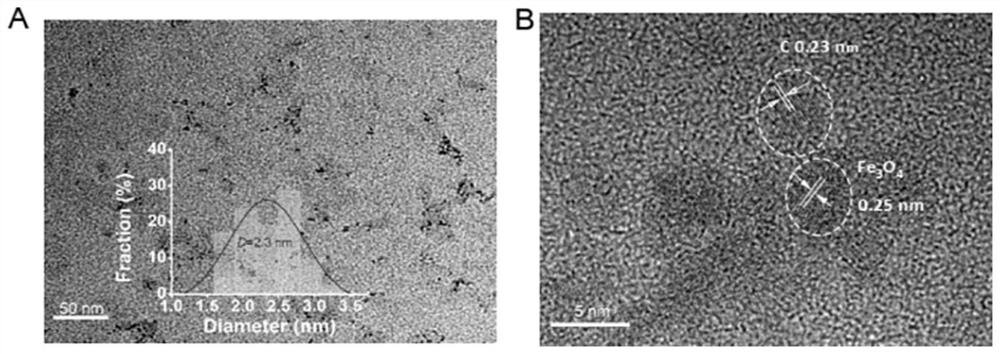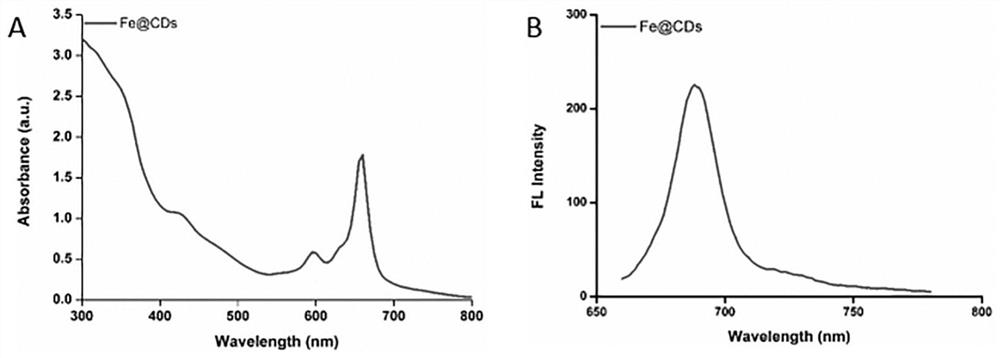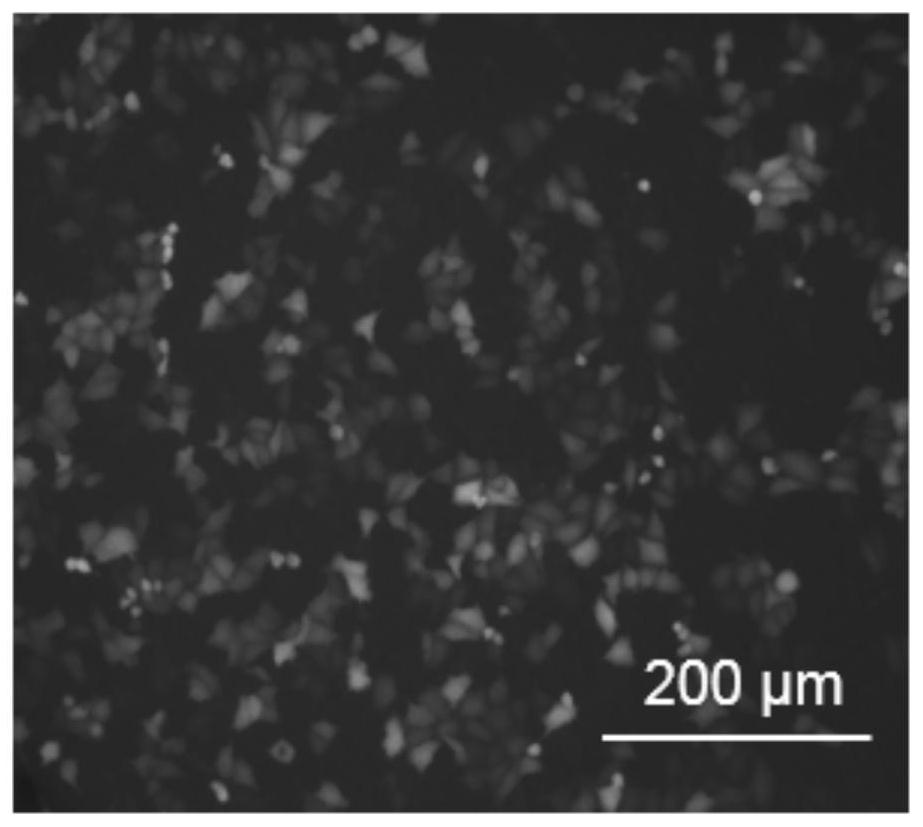Red-light carbon dot and nucleic acid-compound/nano-compound, preparation and application thereof
A nanocomposite and composite technology, applied in the fields of nanomaterials and biomedicine, can solve the problems of low photothermal conversion efficiency, poor biocompatibility, limited application, etc., and achieve high photothermal conversion efficiency, easy preparation, and strong absorption. and launch effects
- Summary
- Abstract
- Description
- Claims
- Application Information
AI Technical Summary
Problems solved by technology
Method used
Image
Examples
Embodiment 1
[0035] The iron phthalocyanine carbon dots prepared in this example can be used for fluorescence imaging and gene therapy. The preparation process includes:
[0036]Weigh 20mg of iron phthalocyanine into a beaker, add 40ml of DMF, sonicate for 30min, add 10mg of hydrogen peroxide and stir at room temperature for 5 minutes; add 10mg of 3rd generation dendritic arginine polypeptide lipid, and stir for 10min at room temperature;
[0037] Pour the above solution into a 100ml polytetrafluoroethylene-lined reaction kettle at a temperature of 180°C, react for 24 hours, and place it at room temperature to cool; add 160ml DMF to dilute 5 times, and then centrifuge at a speed of 5000rpm / min for 10 minutes , use a 0.22 μm filter head to remove large particles, and then use a dialysis bag with a molecular weight of MWCO=1000Da to dialyze in absolute ethanol for 24 hours, and change new absolute alcohol every six hours; after dialysis for 24 hours, vacuum distillation spin The solvent was ...
Embodiment 2
[0043] The amphiphilic iron phthalocyanine carbon dot nanocomposite prepared in this example can be used for fluorescence / photoacoustic / photothermal / magnetic resonance imaging and chemical kinetic / photothermal therapy for passive tumor targeting. The preparation process includes:
[0044] Weigh 20 mg of iron phthalocyanine into a beaker, add 40 ml of DMF, ultrasonicate for 30 minutes, add 10 mg of hydrogen peroxide and stir for 5 minutes at room temperature; add 5 mg of the second-generation dendritic arginine polypeptide lipid, and stir for 10 minutes at room temperature; pour the above solution into 100 ml reaction kettle lined with polytetrafluoroethylene, the temperature is 180 ° C, react for 24 hours, place it at room temperature to cool; add 160 ml DMF to dilute 5 times, then centrifuge at 5000 rpm / min for 10 minutes, filter with 0.22 μm First remove the large particles, and then use a dialysis bag with a molecular weight of MWCO=1000Da to dialyze in absolute ethanol for ...
Embodiment 3
[0050] In this example, water-soluble manganese phthalocyanine metal-doped carbon dots are prepared, which can be used for gene therapy; the preparation process includes:
[0051] Weigh 40 mg of manganese phthalocyanine compound into a beaker, add 60 mL of glycerol, sonicate for 30 minutes, add 30 mg of hydrogen peroxide, and stir for 5 minutes at room temperature; add 10 mg of polyethyleneimine with a molecular weight of 25 kD, and stir for 10 minutes at room temperature;
[0052] Pour the above solution into a 100ml polytetrafluoroethylene-lined reaction kettle at a temperature of 200°C, react for 24 hours, and place it at room temperature to cool; add 60mL glycerol to dilute twice, and centrifuge at 6000rpm / min for 10 minutes; Use a 0.22μm filter head to remove large particles, and then use a dialysis bag with a molecular weight of MWCO=1000Da to dialyze in absolute ethanol for 24 hours, and replace with new absolute alcohol every six hours; after dialysis for 24 hours, vacu...
PUM
 Login to View More
Login to View More Abstract
Description
Claims
Application Information
 Login to View More
Login to View More - R&D
- Intellectual Property
- Life Sciences
- Materials
- Tech Scout
- Unparalleled Data Quality
- Higher Quality Content
- 60% Fewer Hallucinations
Browse by: Latest US Patents, China's latest patents, Technical Efficacy Thesaurus, Application Domain, Technology Topic, Popular Technical Reports.
© 2025 PatSnap. All rights reserved.Legal|Privacy policy|Modern Slavery Act Transparency Statement|Sitemap|About US| Contact US: help@patsnap.com



